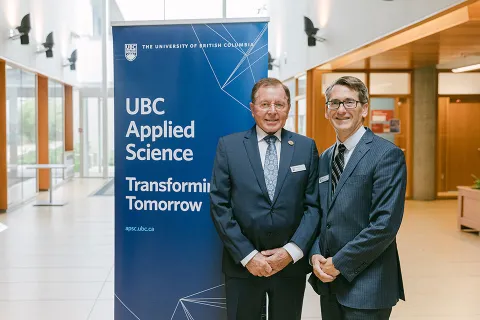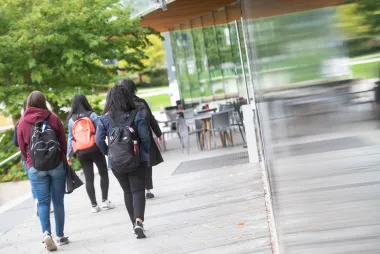Kaiser Foundation for Higher Education donates $10M to the future of renewable power at UBC Engineering.

While you sleep at night, the building keeps working, drawing power from the city grid and storing it. At noontime, when activity is high and city energy is at peak demand, the building releases its nocturnally stored power, supplying itself.
This innovative prototype lies at the heart of UBC’s Fred Kaiser Building. The battery energy storage system, one of the world’s first at building-scale, demonstrates how future architecture could be made more resilient, especially in the face of the extreme weather fluctuations associated with climate change.
A great supporter of UBC over the past two decades, the Kaiser Foundation for Higher Education not only supported the building’s construction in 2005, but his former company Alpha Technologies supplied power converters for the installation of the energy storage system in 2013. Now, the foundation has expanded its commitment to UBC Engineering even further, donating $10M to establish the Fred Kaiser Chair in Power Conversion and Sustainability, which will enhance vital energy system research and educate new generations of sustainability-minded engineers.
“Chairs are absolutely critical to our research ecosystem here at UBC,” says James Olson, Dean of the Faculty of Applied Science. “It’ll be exciting to see how this new chair will expand and build on the success of our faculty’s previous professorship in this important field.”
Awarded to Professor Martin Ordonez, this new gift will enable his team to innovate power conversion technologies that will improve the reliability and efficiency of sustainable power while also lowering costs. Why is this so important? Canadians, for one, often take electricity for granted, but our current power infrastructure—designed in another age for another energy regime—needs converting if solar, wind and other forms of clean energy are to be scaled up nationally and globally.
Incorporating more renewable energy in the Canadian power grid, for example, would require battery energy storage systems. Renewable energy could then be stored and delivered to provide grid stability.
"We're at a crucial point where we need to electrify the planet sustainably," says Ordonez. "But we're also at an inflection point where new semiconductors like Gallium Nitride could significantly impact power conversion efficiency, which would change the world."
Besides supporting innovations like these, the Kaiser Foundation for Higher Education’s gift will also increase the number of graduate students and research professionals educated in power sustainability. This includes the expansion of “Sustaingineering,” a global UBC-led network of universities and NGOs spanning Mexico, Canada, Nepal and Nicaragua.
“Technology is the product of hard work, problem-solving and perseverance,” Kaiser says. “And if these advancements are to positively impact society, we can’t leave them in the laboratory. Otherwise, research is just an exercise."
Kaiser speaks from entrepreneurial experience, having had his own impact over the course of his 40-plus-year career in revolutionary power technologies. For one, he co-founded Alpha Technologies, an established leader of power solutions for Telecom, Cable-Broadband, Security, Wireless and Renewable Energy.
And Alpha has an origin story that any entrepreneurial student would dream of.
From Grey Cup Blackout to Power Solutions
In 1975, Kaiser had been watching the 63rd Grey Cup, the Canadian Football League finals, on TV when his Vancouver suburb experienced a power outage. Like others in Delta, he wondered who had won the game.
Not long after hearing that Edmonton had narrowly defeated Montreal (9-8), Kaiser began to develop a backup power system in his basement.
“I always encourage students to take risks,” he says. “To make mistakes and make them often. That’s how you learn.”
Today, engineering professionals possessing entrepreneurial spirit—and trained in power sustainability issues—are needed more than ever. Two billion people currently live in energy poverty. Complicating this global situation is the lack of extensive power infrastructure in some emergent nations.
Yet this situation may present an unexpected advantage, according to Ordonez. Rather than replicating, say, a North American power grid designed for fossil fuel-derived energy, some nations and communities may benefit from a "blank slate"—the freedom to create their grids from scratch.
One day, power conversion tech may also support the growth of what Kaiser and Ordonez both believe is necessary: a circular clean energy economy, especially in BC.
"Sustainability would become an economic engine,” says Ordonez, “and the economic engine would then support sustainability."


